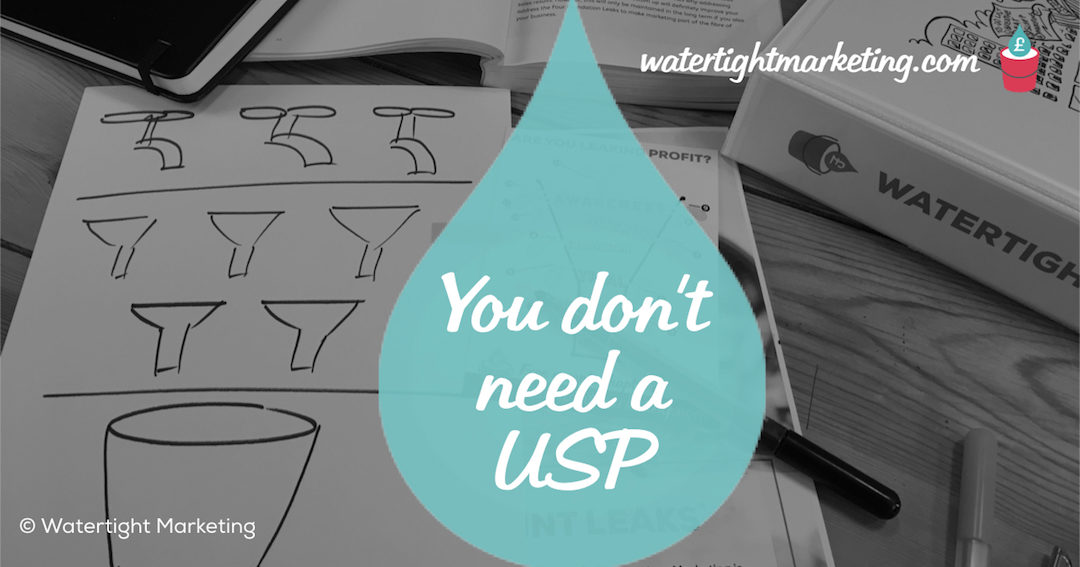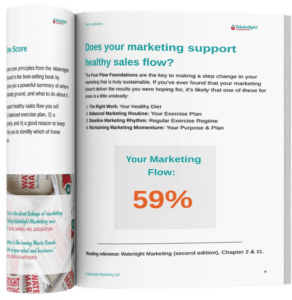Doubtless you’ve heard of your ‘unique selling point’ or USP – from lots of marketing literature you’d be forgiven for thinking that you simply cannot do anything until you have one. Well, I disagree.
I’ve disagreed with this for years, as many of my clients will testify. And, I’ve nearly blogged on it a few times, but there was a little niggle at the back of my mind telling me that if the whole world seemed so wedded to the idea, who was I to question it?
So, I was delighted to see The Harvard Business Review saying pretty much the same thing. In an article by Freek Vermeulen, they explore how ‘You Can Win Without Differentiation‘, i.e. you do not need to be unique.
They take the example of McKinsey and all the other management consulting companies. They conclude that the success of McKinsey is based on their reputation and relationships, NOT on the quality or uniqueness of what they do.
So, what can a small business do if they’re not that different from the competition?
It’s a great example. But, many small business owners will think, ‘Hey, I’m not McKinsey, this doesn’t apply to me’. But, I’d say it’s even more true in small businesses. Here are three things I often say to a small business owners in a crowded market:
1) Put your proposition out there
In the last week, I’ve had three one-to-one sessions with small business owners on the Watertight Workgroup programme. Each one of them asked about their proposition, and was worried that it wasn’t different enough from the competition. It was holding them back. Because the USP idea is so pervasive, they were paralysed from putting a decent proposition out there. Why? Because, there were other people selling something similar.
If you only went to market when you had something completely unique, you’d probably:
- a) end up putting something out there that nobody wants, or
- b) never go to market at all.
In fact, when it comes to building your proposition I’d advise you to stop looking at the competition. They’re almost always a distraction. If you have a product or a service that you know people will want (because you’ve asked them), and you know you’ll do it well… put it out there.
2) Talk to people
The HBR articles argues that when there are lots of seemingly similar options “buyers rely on other signals to decide whether to purchase, such as the seller’s status, its social network ties, and prior relationships.”
This should be music to a small business owner’s ears. It’s often easier to build authentic relationships with customers, suppliers, employees, referrers, etc. when your business is small and nimble. There’s less red tape around what you can and can’t say, and you’re not slowed down by corporate decision-making.
What leaps out of this for me is the importance of networking… the digital and traditional kind.
Go on, get out that little black book (known as LinkedIn these days), call a few people, invite them out for lunch. Have a chat!
3) Leave a positive legacy
But, if there was only one key lesson to take from this article (and from what many others are saying in an increasingly connected world) it is to put your energy into building up your Commercial Karma.
Your business’ reputation is built incrementally from the legacy of every interaction you have with people. The impression you leave and the memory they store as a result of seeing you, hearing you, reading your stuff, using your products, etc. This is the more important than any USP you could come up with, ever.
If you focus on leaving a positive impact on every person your business encounters in some capacity, you’re well ahead of the game. You do this by treating people decently, being genuinely helpful, and being generous with your knowledge and expertise.
It’s about getting the fundamentals right. If your small business marketing focusses on these three things, you can establish a sustainable business.
Once you’ve done this, proven there’s a market and got that bank of goodwill behind you… then an investment in brilliant creative and content can and will make you stand out even further and grow faster. But, honestly, you can build a decent business simply by being, well… decent.
© Bryony Thomas – The Watertight Marketer.

Bryony Thomas
Author & Founder, Watertight Marketing
Bryony Thomas is the creator of the multi-award winning Watertight Marketing methodology, captured in her best-selling book of the same name. She is one of the UK's foremost marketing thinkers, featured by the likes of Forbes, The Guardian, Business Insider and many more, and in-demand speaker for business conferences, in-house sales days and high-level Board strategy days.



Bryony – I completely agree. As it happens, just before I received an email about your blog today, I was reading the HBR blog having seen it via another route. Having worked in-house for many years and struggled sometimes to come up with a USP and more recently working with clients – who face a similar struggle – I too have always felt uncomfortable with the notion that every company needs to come up with something truly unique to make money. Intellectually, surely, that can’t be right – it is just not possible for millions of UK businesses to be truly unique in what they offer.
There is clearly more than one fantastic hairdresser, lawyer, accountant, sandwich shop, etc but if you concentrate on understanding why people buy and motivating them to do so (rather than selling what you are offering) you are much more likely to be successful.
But what if you competitors are also great at what they do, decent people who are focused on delivering first class service and freely share their knowledge and expertise? Then, I would say, it’s about customer choice, making it easy for them to buy from you, and focusing on what’s right for the client (which might not be you, this time). And keeping that relationship even though they might have gone with a competitor.
Making is easy to buy can make such a big difference to conversion. Especially in a knowledge business. It can be really hard to say yes to a vague consulting or coaching type arrangement. Re-packaged as an audit or clear programme with outcomes, etc. and the buyer has something they can readily understand and say yes to. Much like in the charity sector, where a packaged product (like child sponsorship) has better uptake than simply asking for the same amount of money as a general donation.
Great post Bryony. Although one could argue that McKinsey’s USP was it s reputation. But that is not the point. For small firms it is all about building a reputation and becoming a trusted advisor or honest broker.
I agree, reputation is indeed often the unique thing. But, the way buyers think about it is very different.
The USP theory goes that if you hit on something totally unique (that buyers want) they will buy from you because they can’t get that anywhere else. It assumes a relative logic being applied to the decision… i.e. of everyone on the market I choose this because of the USP.
With relationships and Commercial Karma, the thought process isn’t like that… the buyer doesn’t consciously think “I can’t get this relationship from anyone else, I will buy from them”… they simply think “I like and trust these people, I’m not going to look any further.” With an emotional connection and trust, buyers don’t even make a comparison with anyone else.
I love this blog post! Best line….”you can build a decent business simply by being, well… decent.”
Really interesting article Bryony. It took me two reads to decide whether to shake my head or scratch my head.
Here’s my take. There’s a difference between the USP (Product Perspective) and the Differentiator (Brand Perspective). The USP is what the product does. The differentiator is how we present that product, in the context of our audience.
I completely agree with your comments and those in the HBR article. You don’t need to build difference into the end product. We can all try to create products that perform equally as effectively. The ‘differentiator’ is the way we wrap up that product and inject emotion.
It’s nothing to do with the traditional 4 P’s (which sit alongside USP). This is to do with how our craft makes our consumer feel, both pre- and post-sale.
Thanks for sharing a great article.
Hi Ian, thanks. I’d love to hear you’d shaken or scratched your head. Providing it gets the grey matter going, I’m happy!
I think the point I’m really making is that lots of businesses are genuinely very, very, similar. And, all still make money. It can often be that you simply go with the first person who meets the spec, and you feel right with, rather than looking for something wholly unique. Or, even that different. You wouldn’t know they were different if you just didn’t look at any more options… “hmmm, they do what I need, and I like them, I’ll work with them.” Nowhere in this is the thought – “I simply couldn’t get this anywhere else.”
The USP, or even differentiator, often scares people into thinking they have do be worlds apart to make money. I’m not saying that brilliant creative, and a clear and compelling differentiator wouldn’t help them go further, faster. It’s just not always *mandatory* in order to have a robust business. And, for many, that’s exactly what they want. This might sound weird to those of us aspire to more, but…. honestly, honestly, honestly, a number of owner-managed businesses would love a bit of predictable, steady, (not earth-shattering) growth. And, for that, neither a unique product, nor a differentiated brand is essential.
Thank you for this post. I’ve been scratching my head too as I’ve just listened to Brian Tracy espousing the necessity of a USP – but I’m in homewares, specifically bed linen where there are many competitors and almost no one is truly unique.
I was really struggling to come up with something and wondering if it’s even as necessary as is suggested. A Google search led me to your post – thank you. It came at exactly the right time.
Thanks Kamila. In a consumer market, I’d focus on the personality of the brand rather than the USP of the product. I’m sure there are others selling exactly the same lines as you, and so it’s your service and the ‘feel’ of buying from you that’s likely to differentiate. Check out our lovely clients, Audenza, for an example of an online homewares business doing exactly that!